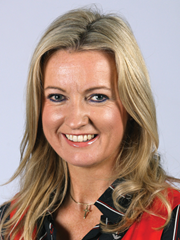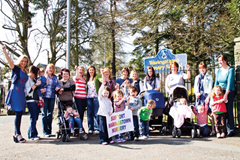Jo-Anne Dobson MLA
 Jo-Anne Dobson was elected as a UUP MLA for Upper Bann in May. A Craigavon Borough Council councillor for Lurgan since January 2010, she is standing down to avoid double-jobbing. Jo-Anne is the party’s agriculture and rural development spokeswoman. She lives on the family farm in Waringstown with her husband John and two sons, Elliott and Mark. Her previous job was managing MEP Jim Nicholson’s Belfast office and her committee memberships are agriculture and education.
Jo-Anne Dobson was elected as a UUP MLA for Upper Bann in May. A Craigavon Borough Council councillor for Lurgan since January 2010, she is standing down to avoid double-jobbing. Jo-Anne is the party’s agriculture and rural development spokeswoman. She lives on the family farm in Waringstown with her husband John and two sons, Elliott and Mark. Her previous job was managing MEP Jim Nicholson’s Belfast office and her committee memberships are agriculture and education.
Where does your interest in politics come from?
My mother, Joanie, sowed the first seeds of my interest in politics many years ago. I joined the Ulster Unionist Party, taking an active role and holding a number of positions within the party. I was elected to serve on Craigavon Borough Council in the January 2010 by-election winning 64 per cent of the vote and, in May 2011, was elected as an MLA for Upper Bann.
What motivates you?
My son Mark had a successful kidney transplant two years ago and I dedicate much of my spare time (which is in short supply at the moment) to raising funds and awareness of the vital issue of organ donation. I am voluntary press officer for the Northern Ireland Kidney Patients Association (NIKPA) and was proud to host the launch of the British Transplant Games as my first event as an MLA at Stormont.
I have also taken an active role in the promotion of gender equality in politics by encouraging more women to participate in what has traditionally been a male- dominated arena.
I believe that when women step up, they can be successful in politics and make a positive contribution to making the political process work for all of us.
I believe in grassroots politics, working closely with people and representing their views and opinions.
People need to feel that their voice can be heard, that decisions are not just taken for them, but that they too can contribute to making Northern Ireland a better place for all of us.
What are the UUP’s main priorities for agriculture?
Agriculture remains a significant industry and employer in Northern Ireland with a direct workforce of some 48,000 people and an annual contribution of £304 million gross value added to the local economy.
The single biggest issue facing Northern Ireland’s farmers over the next number of years is the imminent reform of the Common Agricultural Policy. We must ensure that the United Kingdom puts forward a strong and collective argument in favour of retaining as much as possible of the previous funding stream. It is also critical that the final resolution is fair and equitable for the farmers and landowners, on which it is going to have such a huge impact.
The UUP will also continue to prioritise promoting Northern Ireland’s currently thriving agri-food industry as well as keeping a watchful eye on the cost developments of the three Fs: fuel, feed and fertiliser.
Farmers often see the Department of Agriculture (DARD) as part of the problem, rather than the solution. I want to see a change in the relationship between DARD and farmers: a recognition from the department that this industry is successful because farmers and the agri-food industry do the hard work day in and day out.
 In your view, how do the Department of Education’s criteria for nursery places need to change?
In your view, how do the Department of Education’s criteria for nursery places need to change?
A significant number of children across Northern Ireland are being unfairly denied a place at nursery school, with the present the system of allocating places boiling down to little more than a lottery.
The UUP believe that every child should be entitled to a statutory nursery school place and indeed we included a commitment of making pre-school education a universal entitlement in our recent election manifesto. I have raised this issue in my maiden speech to the Assembly, directly with the Minister and also at the Education Committee.
This issue has received cross-party support in the Assembly and I and my party colleagues will be working to ensure that a solution is brought forward by the Education Minister.
The system of identifying demand for increased nursery provision is also fundamentally flawed. I have been leading the campaign to establish a statutory nursery school in my home village of Waringstown which does not as yet have one, despite having almost 5,000 residents.
The UUP seems strong in Upper Bann despite declines elsewhere. What explains this trend?
The UUP has an extremely strong team in Upper Bann. During the recent Assembly election campaign we had three dedicated Assembly candidates, as well as a swathe of local government contenders, working on the ground across the constituency and that brought out the Ulster Unionist vote.
Our percentage vote has increased since the 2007 Assembly elections and we also increased our number of councillors on Banbridge District Council. I honestly believe that it goes to show that a mixture of hard work on the ground, in combination with a good team of candidates, is what the electorate in Northern Ireland wants.
The UUP is going through a period of change and renewal with our MLAs and councillors working hard on the ground to deliver for all of the people of Northern Ireland.
How do you relax in your free time?
My free time is at a premium at the moment. I do like to go to the gym but running around Stormont is also a good way of keeping fit. When I do get the time, which is very seldom, I lend a hand on the farm which is a very good way to clear all thoughts of politics from my head, if only briefly.
I like to support as many charity events as I can. Recently, I was a judge at the hugely successful ‘Let’s Dance for the NSPCC’ charity event held in Banbridge. This event was great fun and raised over £14,000 for this worthy cause.





